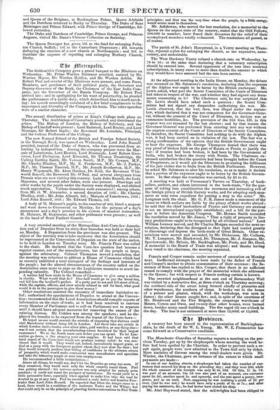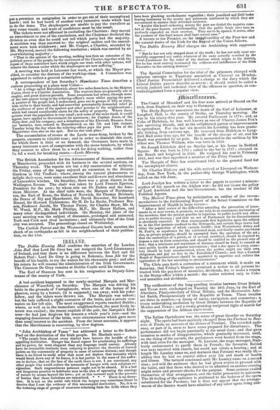gbe Vrobiptes.
A vacancy has been caused in the representation of Buckingham- shire, by the death of Sir W. L. Young. Mr. W. E. Fitzmaurice has come forward as a Conservative candidate.
The Manchester Guardian of Saturday reports a meeting on the pre- vious Tuesday, got up by the shopkeepers whose meeting the week be- fore had been spoiled by the Chartists. In order to prevent such a re- sult again, people were now admitted to the Town-hall only by ticket. More statistics of distress among the retail-dealers were given. Mr. Winder, the Chairman, gave an instance of the extent to which small payments are made— In one of our leading streets, a shopkeeper had taken the number of cos. tomers that entered his shop on the preceding day ; and they were 240, while the whole amount of his receipts was only 4/. 6s. 10d. Of this, 1/. Ss. 7c/- was part of an account, I4s. ld was also part of an account, one customer spent 2s. 8d., another spent ls. and upwards, and the rest spent a penny, two- pence, and so on each. Now, supposing he was realizing a profit of 10 per cent, (but he was not,) he would have only a profit of 6s. or 7s.; and after paying his assistants, &c., he had better have closed his shop.
Mr. Abel Heywood stated, that the millwrights had been obliged to
put a premium on emigration in order to get rid of their unemployed hands ; and he had heard of another very extensive trade which had to do the dame. The shopkeepers are unable to pay the travellers as they come round; and want of confidence must be the result.
The tickets were not effectual in excluding the Chartists : they moved an amendment to one of the resolutions, and the Chairman declared the division so even that he could not tell which party had the majority. A coalition was then resorted to: the original motion and the amend- ment were both withdrawn ; and Mr. Cooper, a Chartist, seconded by Mr. Heywood, moved the following resolution ; which was carried by an overwhelming majority-
" That in the opinion of the meeting, nothing less than an extension of the political power of the people, by the enactment of the Charter, together with the repeal of those restrictive laws which cripple our trade with other nations, will remove the distress under which the shopkeepers are now suffering."
A meeting was held at Leicester last week, at which the Mayor pre- sided, to consider the distress of the working-class. A Committee was appointed to collect a general subscription.
A correspondent of last Saturday's Manchester Times describes a curious proceeding at a place near Colne-
n At a village called Bamoldswick, about five miles from here, in the Skipton Union, there is a Chartist Association. The weavers there are generally out of employ, and great distress prevails. Some uneasiness had arisen, through some of the rate-payers being in the relieving-officer's room whilst paying the poor. A number of the people had, I understand, gone out in groups of fifty or sixty, with sticks in their hands, and had somewhat peremptorily demanded relief at the residence of some of the opulent and other persons in the neighbourhood ; which had caused considerable alarm for the safety of property. Where these persons went the population is very small ; and some of the more timid, it would appear, have applied to Government for assistance ; for Captain Jones, of the sixty-first, and his company, and a detachment of the Eleventh Hussars, from our barracks, were ordered to Barnoldswick on the 7th and 14th instant, Tuesday being the day when the relieving-officer pays the poor. Two of the Magistrates were also on the spot. But no riot took place.'
The accumulation of stones at the Leeds stone-heap, broken by the paupers, amounts to 150,000 tons ; and in order to diminish this stock, for which there is little or no demand, the Overseers have made in many instances a sort of compromise with the stone-breakers, by which they consent to allow them 6s. a week for doing nothing, rather than 7s. 6d. a week for breaking stones.—Leeds Mercury.
The British Association for the Advancement of Science, assembled at Manchester, proceeded with its business in the several sections, on Thursday week. The reports are but a dry enumeration of subjects. On Friday, some of the sages enjoyed an excursion to the Botanic Gardens at Old Trafford; where, among the natural phamomena to delight their eyes, were some excellent fruit and flowers and abundance of Lancashire witches. On Saturday, there was a great dinner, in the Wellington Rooms. The chair was taken by Lord Francis Egerton, President for the year ; by whose side sat Dr. Dalton and the Ame- rican Minister. At the chief table were, the Marquis of Northamp- ton, the Earl of Bosse, the Bishop of Norwich, Sir Thomas Brisbane, the Deans of Ely and Manchester, Sir David Brewster, Sir Isambard Brunel, Sir Howard Elphinstone, Sir H. De La Beche, Professor Bes- sels, Professor Jacobi, Sir Thomas Potter Sir Charles Shaw, Mr. G. W. Wood, ALP., Mr. Mark Phillips, M.P., Mr. Henry Hallam, and many other distinguished individuals. On Monday, the place of the next meeting was the subject of discussion, prolonged and animated. York and Cork sent rival invitations ; and ultimately that of the Irish city was accepted. The proceedings closed on Wednesday.
The Carlisle Patriot and the Westmoreland Gazette both mention the shock of an earthquake as felt in the neighbourhood of their publica- tion, on the 21st.



























 Previous page
Previous page